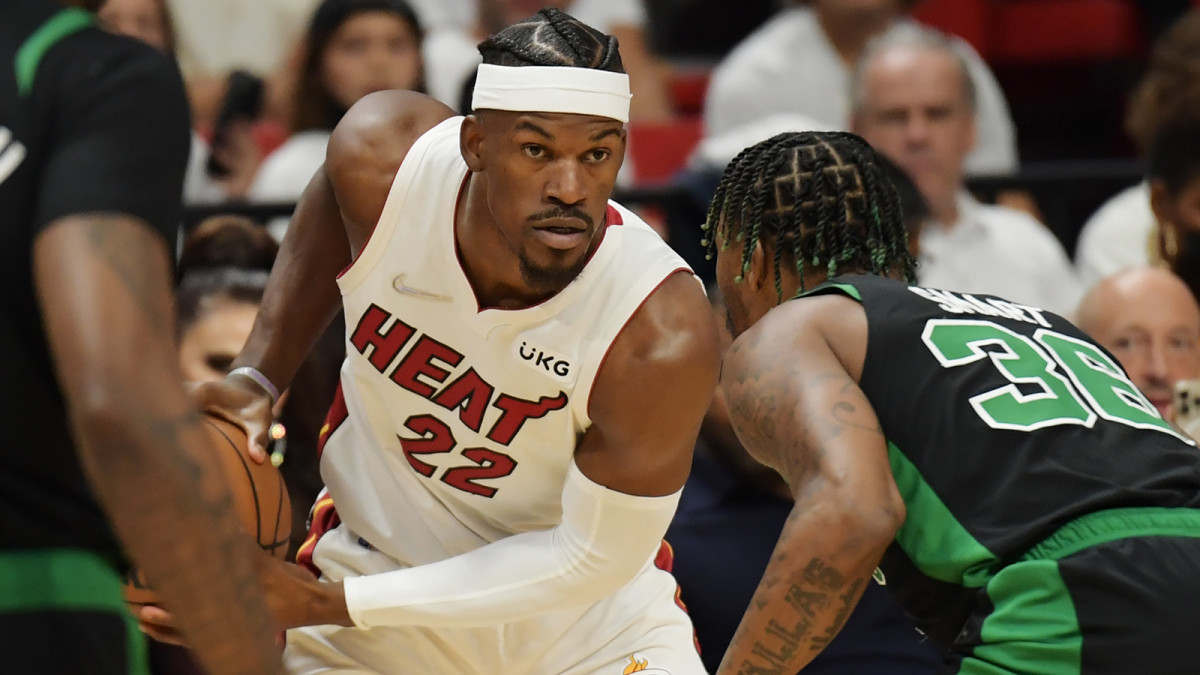When Will Jimmy Butler Get His Moment in the Sun?
Piggybacking off Rohan Nadkarni's piece, the focus on Jimmy Butler and that last play left me wondering: Will we ever get the chance to call him an NBA champion? And is he even universally thought of as the sort of player—that sort of megastar—whose career is judged in part by that outcome?
If he isn’t, he probably should be.
He came up just short of leading a second team to the NBA Finals in three seasons. And before his time in Miami, he dragged a young, flawed Timberwolves club across the finish line to reach the postseason after a 14-year drought. (Just in case you’ve forgotten: Butler had the Wolves in fourth place in the West when he left the lineup due to a torn meniscus. By the time he came back six weeks later, the team had nearly fallen out of the race. With him in the lineup, they won the final three games of the campaign to earn the final playoff spot in the last game of the year—one in which Butler was every bit as good as future MVP Nikola Jokić.)
And none of this even touches on the fact that he was perhaps the best running mate Joel Embiid ever had in Philadelphia. He’s someone who can go out and get you 35. Someone who’s going to be fearless, declining to shy away from contact. Someone who is going to tighten the screws on the other side of the ball, who seems to relish the big games, rather than camouflage into the background during them.
This isn’t to say Butler never goes quiet. Hell, in this Boston series alone, he had back-to-back-to-back contests of 3-for-8, 3-for-14 and 4-for-18. His shooting from the perimeter had come back down to earth by the end of the series, illustrating part of why the late shot in Game 7 came under so much scrutiny. (Look no further than his sub-30 three-point percentages the last three seasons.) But looking at the circumstances—Tyler Herro’s being hurt, Bam Adebayo’s aggressiveness being up and down, Kyle Lowry’s not looking like himself and Duncan Robinson’s being unusable at times—meant the workload on Butler was immense. In the other four games of the matchup with the Celtics, he had 41 points, 29 points, 47 points and 35 points.

That sort of output, combined with his passing skill, combined with his rugged, yet foul-averse defense—he’s one of the few forwards in the game who has more steals than personal fouls for his career—puts him in right around the top 10 or 15 most impactful players every year. Rarely is he right at the top when everyone is healthy. But there are seemingly few guys you’d want to have in a “gotta have it” sort of game than Butler, who digs deeper than everyone else to find whatever he has left. It’s sometimes strange to watch him do it, because he often waits to floor the gas pedal until his team has shown it has no other choice. That was the reality in Philly and Minnesota at times, and his ability to turn on his scoring almost felt machine-like with how easily he could find that zone. He’s a magnet for free throws.
You never hear anyone say, “When is Butler gonna win the big one?” He’s not LeBron. He’s not Harden. He’s not Chris Paul. In a way, far from it. Butler was the last pick of the 2011 first round, not the first pick. No expectations come attached to a selection that far down. But much like this Celtics series, Butler carried his shorthanded team in 2020 against LeBron and the Lakers, dominating statistically—26.2 points, 8.3 rebounds, 9.8 assists and 2.2 steals per game on 55% shooting—until Los Angeles finally put the Heat away in six tough games.
There’s no sense that the ability of Butler, who turns 33 before the start of next season, would somehow be forgotten anytime soon. Basketball Reference, which lists Butler’s most statistically similar counterpart as future Hall of Famer Kawhi Leonard, has Butler pegged for a 71.1% probability of making the Hall, based on his career statistical profile. Miami is coming off a season in which it landed the East’s No. 1 seed despite just about all of its best players—Butler included—missing considerable time during the campaign.
Butler will hopefully continue to be elite for at least a few more years. Even if he starts to decline, he’s the sort of player you’d love to see win the whole thing someday—not only because it would validate him even more, but also because we’d know that he’d left virtually everything he had on the court, like he did when he played all 48 minutes in Game 7 and 46 minutes in Game 6.
When we’re talking about players as skilled and talented as Butler is, that effort speaks volumes.
More NBA Coverage:
